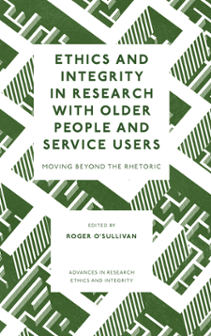
Glossary*
Ethics and Integrity in Research with Older People and Service Users
ISBN: 978-1-80455-423-4, eISBN: 978-1-80455-422-7
ISSN: 2398-6018
Publication date: 24 November 2023
Citation
(2023), "Glossary
Publisher
:Emerald Publishing Limited
Copyright © 2024 Roger O’Sullivan. Published under exclusive licence by Emerald Publishing Limited
Bureau of Sages – A research advisory board, established by CJE SeniorLife (previously the Council for Jewish Elderly), where members share experiences, build knowledge, and develop skills for working together with researchers to provide voice to the direction, design, and implementation of research.
Co-creation, Co-design and Co-production – Although used interchangeably are different concepts but do share a common purpose of collaboration and knowledge utilization.
Engagement – Information about research is shared and disseminated e.g. events raising awareness of research findings.
Ethical/Ethics Review – Research which will involve people as participants requires a research ethics review or appraisal in a Research Ethics Committee (REC) or an Institutional Review Board (IRB).
Ethnographic Research – A mainly qualitative field-based research method employing observation and interviewing to investigate social practices and the meanings behind social interaction with participants in their own environment.
Intervention – A research programme or deliberate action intended to elicit or assess a change in the social setting, group, community or amongst participants.
Involvement – Actively incorporate service users in research projects, for example, to inform the research design, aims, methods, and dissemination of findings.
Lay Members – Someone independent of a university or research institution. It may also include someone who is not currently professionally qualified e.g. in healthcare but has a personal interest in the research topic.
Participant – Someone who takes part in a research study as a ‘subject’ of the research.
Patient and Public Involvement/Public Patient Involvement/Personal and Public Involvement (PPI) – Used to describe involving users to inform design, delivery, or evaluation of health and social care services or research.
Research Advisory Group – A forum to engage and listen to the views and experiences of service users to support the research activity.
Research/Informed Consent – Formal agreement to take part in research.
Research Ethics – Focused on upholding scientific standards; compliance with the law and avoidance of social and personal harm to participants.
Research Ethics Committee (REC) or Institutional Review Board (IRB) – Institution or organisational appointed groups to review research proposals and give an opinion about whether the research meets the required standards.
Research Integrity – Based on reliability, honesty, respect and accountability.
Systematic Review – Extracting, interpreting and analysing data from existing published research to form an overall conclusion.
Team Science – Inclusion of people with lived experience as equal member(s) of the research team.
User Involvement in Research – The active involvement of users, for example, to inform research design, aims, methods, and dissemination of findings.
For a useful resource of key research terms and definitions – see http://prores-project.eu/glossary-of-terms-and-concepts/.
- Prelims
- Section 1 ‘Views From the Researchers’
- Chapter 1 Theory and Practice of User-Involved Research
- Chapter 2 Navigating Person-Centred Ethics: A Sensory Ethnographic Study Involving Older People Living With Dementia and Family Carers
- Chapter 3 Incorporating Older Adult Voice Into Meaningful Research – ‘It's About Time’
- Chapter 4 Family Conflict in Dementia Caregiving: Maintaining Research Ethics and Integrity
- Chapter 5 Ethical Issues in Research With Vulnerable People: A Case Study
- Section 2 ‘Views From the Researched’
- Chapter 6 Involving Lay Members of the Public in Research – Reflections and Insights
- Chapter 7 Ethics, Integrity and Co-production in Mental Health Research
- Section 3 ‘Views From Those Who Fall In Between’
- Chapter 8 Research With Older Adults in American Indian Communities – Understanding Knowledge, Power and Practice
- Chapter 9 Engaged Research as Team Science Reflections From the ‘Researcher’ and the ‘Researched’
- Chapter 10 Trying the Patience of Patients: A Personal Reflection
- Appendix
- Further Reading and Resources
- Glossary
- Index